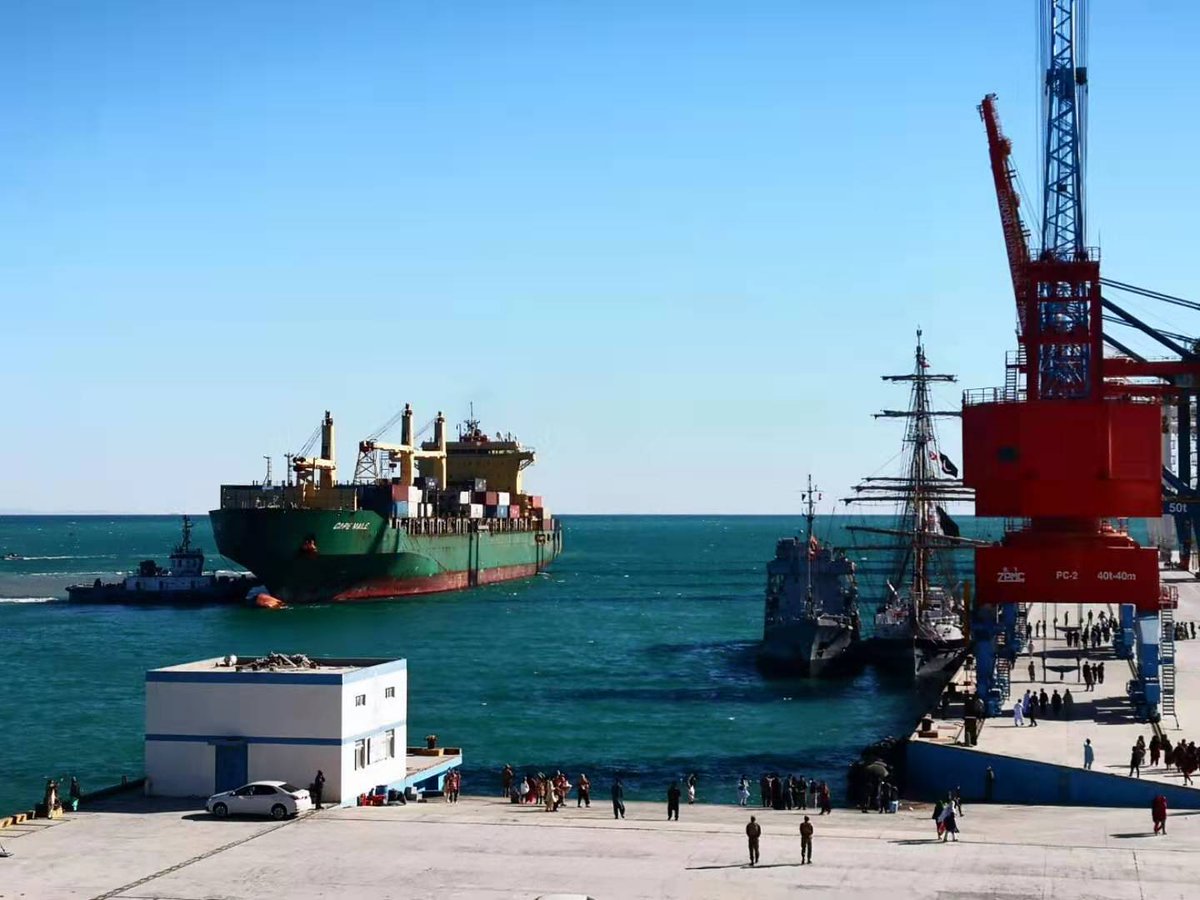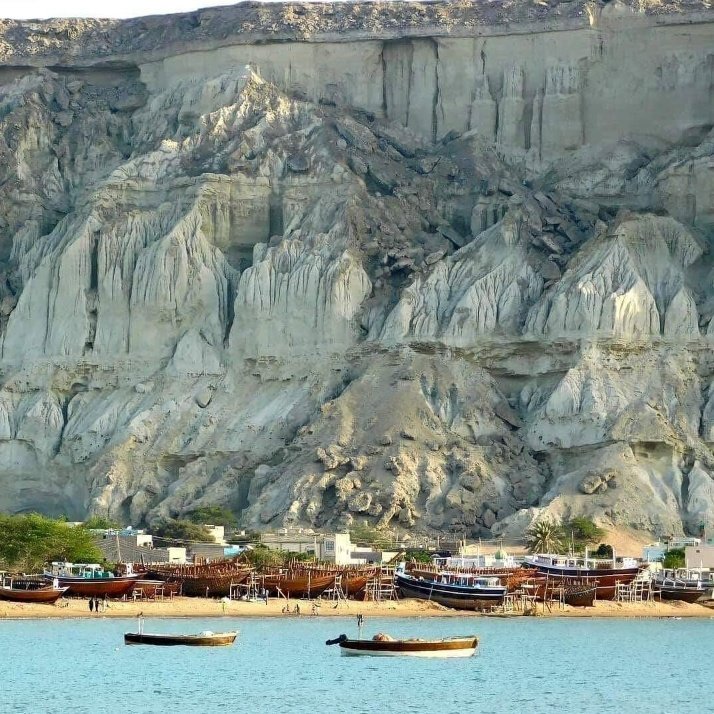How to install the app on iOS
Follow along with the video below to see how to install our site as a web app on your home screen.
Note: This feature may not be available in some browsers.
You are using an out of date browser. It may not display this or other websites correctly.
You should upgrade or use an alternative browser.
You should upgrade or use an alternative browser.
Gwadar port city development project | News and Updates
- Thread starter EagleEyes
- Start date
ghazi52
PDF THINK TANK: ANALYST

- Joined
- Mar 21, 2007
- Messages
- 104,049
- Reaction score
- 106
- Country
- Location


The New #International Airport, Balochistan
With an expected 3,658m runway & 14,000 sqm terminal the China funded (1.7 billion yuan) CPEC project shall be the second airport in Pakistan to handle A380 Traffic
ghazi52
PDF THINK TANK: ANALYST

- Joined
- Mar 21, 2007
- Messages
- 104,049
- Reaction score
- 106
- Country
- Location
Pakistan Navy celebrated 61st Gwadar Day with zeal and fervor. The day commenced with impressive Flag Hoisting Ceremony held at PNS AKRAM attended by COMPAK Vice Admiral Asif Khaliq as Chief Guest and COMCOAST Rear Admiral Faisal Rasul Lodhi. Various activities and free medical camp was organized by Pakistan Navy.
ghazi52
PDF THINK TANK: ANALYST

- Joined
- Mar 21, 2007
- Messages
- 104,049
- Reaction score
- 106
- Country
- Location



ISLAMABAD, Nov. 14 (Xinhua) -- In a nursery which covers an area of around 4,000 square meters, moringa trees whose seeds have fairly high economic values grew taller than a person, Euphorbia milii plants with green leaves and red flowers were competing with each other on appearance, and seedlings in flowerpots made of discarded plastic bottles were nourished by atomizers.
The nursery with over 40 kinds of plants is located at the Gwadar port in Pakistan's southwestern Balochistan province. A hot and dry climate, scarce vegetation and wind-blown sand are the general impressions that Gwadar has left on people's minds.
The Gwadar port is one of the pillar projects of China-Pakistan Economic Corridor. In 2013, China Overseas Port Holding Company (COPHC) was given the contract to operate the Gwadar port and the Gwadar Free Zone, and started to conduct all-round renovation of the port, including improvement of the ecological environment. To make the afforestation work more systematic and scientific, COPHC invited China's Yulin Holdings which has advanced technologies in combating desertification.
"When I first arrived at Gwadar in 2016, there was almost nothing but sand, and I could barely see anything green," said Wang Ruilei who was teaching a Pakistani worker to prune plants in the company's nursery. Born in the 1990s, Wang has become the head of Gwadar Green Ecological S&T Company, a subsidiary of Yulin Holdings.
Wang's company now has five Chinese employees and almost 30 Pakistani workers. Nehmat, a former fisherman and native of Gwadar, has spent two years in Wang's company learning how to grow flowers and lay and repair irrigation pipes. "My family has been very supportive of my work here because the income is higher and more stable. And the work I do is making Gwadar more beautiful," he told Xinhua.
The serious soil salinization and lack of water in Gwadar make it difficult to select suitable plants. "We have tried many kinds of plants and techniques including drop irrigation. Many were successful, but more failed," Wang said.
Altogether, his team has planted 22,000 trees, 40,000 shrubs, 15,000 square meters of lawns, 25,000 pots of flowers and plants, and laid 2,000 meters of irrigation pipes in the Gwadar port area.
In order to realize the secondary utilization of water resources and prevent pollution to the environment by sewage, COPHC has built four reclaimed water systems in the Gwadar port, which also guarantees the water supply for the plants. After years of effort, the Gwadar port now becomes a green pearl in a yellow sand painting.
The lush trees, green lawns and blooming flowers still only exist in the port area, but they are exactly what many Chinese builders think Gwadar will look like in the future. According to Hu Yaozong, deputy general manager of COPHC's subsidiary Gwadar Free Zone Company, COPHC launched a project last year to plant one million trees in Gwadar, which will greatly improve the living environment of the locals.
In addition to the nursery, Yulin Holdings plans to invest in a plant tissue culture center and an intelligent greenhouse in the Gwadar free zone under the support of COPHC, both of which will begin construction this month. After being put into use, the two facilities will be able to produce 16 million seedlings annually.
"The tissue culture center and the greenhouse will provide sufficient seedlings for Gwadar. Our products including flowers and vegetables are expected to be sold throughout Pakistan and even to Middle East countries." said Wang.
Promoting clean energy in Gwadar is also a focus of China. Earlier this month, the Ministry of Ecology and Environment of China donated 4,000 solar energy systems and LED lights to Pakistan to help the country to cope with climate change, especially in the Gwadar region.
Besides inviting a company specializing in combating desertification, COPHC also put forward strict environmental protection requirements for the companies which want to invest in the free zone. Hu said that COPHC sticks to the "dual lifeline" of investment attraction and environmental protection, and hopes to promote the economic development and the ecological construction of the free zone at the same time.
"COPHC attaches more importance to the selection of companies while attracting investment, and meeting the environmental protection standards is the most basic requirement for the enterprises entering the free zone. We hope to attract more 'green companies' with high scientific and technological levels, low resource consumption and low environmental pollution to ensure the sustainable development of the Gwadar port," he added.
ghazi52
PDF THINK TANK: ANALYST

- Joined
- Mar 21, 2007
- Messages
- 104,049
- Reaction score
- 106
- Country
- Location
“Gawadar becomes operational for Exports! Seafood export, in reefer containers, using WeBOC system, started on 19 Nov 2019 through COSCO’s KGS service.”
“The vessel loaded 3 containers of fish for Far Eastern ports.”
The adviser said that average value of cargo was $50,000/container.
This would reduce time taken for trading across borders and also reduce port congestion at Karachi.
Gwadar is Pakistan’s largest infrastructural project since independence.
After the completion of the first phase of Gwadar port, billions of dollars have been invested in Gwadar and in the next one or two years the investment can cross the figure of trillions.
China is a major investor in Gwadar, and has spent $248 million in the first phase of Gwadar port, according to official website of Gwadar Port Authority.

“The vessel loaded 3 containers of fish for Far Eastern ports.”
The adviser said that average value of cargo was $50,000/container.
This would reduce time taken for trading across borders and also reduce port congestion at Karachi.
Gwadar is Pakistan’s largest infrastructural project since independence.
After the completion of the first phase of Gwadar port, billions of dollars have been invested in Gwadar and in the next one or two years the investment can cross the figure of trillions.
China is a major investor in Gwadar, and has spent $248 million in the first phase of Gwadar port, according to official website of Gwadar Port Authority.

POTTER
FULL MEMBER

- Joined
- Jul 17, 2019
- Messages
- 438
- Reaction score
- 1
- Country
- Location
ghazi52
PDF THINK TANK: ANALYST

- Joined
- Mar 21, 2007
- Messages
- 104,049
- Reaction score
- 106
- Country
- Location
Large cargo vessel docked at GITL Gwadar International Terminals Limited, nearly 40 container cargo came to port for New Gwadar International Airport.
local exported sea food with the same vessel.

local exported sea food with the same vessel.

Pakistansdefender
SENIOR MEMBER

- Joined
- Sep 22, 2016
- Messages
- 3,770
- Reaction score
- 1
- Country
- Location
Boat building companies.....

Imagine the bangles on that mountains. Just like in italian coast or Turkish coast. Where people in travel just to see expensive villas of celebritiesBoat building companies.....

ghazi52
PDF THINK TANK: ANALYST

- Joined
- Mar 21, 2007
- Messages
- 104,049
- Reaction score
- 106
- Country
- Location
Construction Work on Gwadar East Expressway under CPEC completed 46% .
Total $51 billion allocated for CPEC projects, 13 projects have been completed with the estimated cost of around 11 billion dollars, whereas another 13 projects worth $21 billion are underway.
An additional $21 billion-dollar worth projects are in pipeline.
Construction work on Gwadar East Bay Expressway has reached 46% adding after ope rationalization.

Total $51 billion allocated for CPEC projects, 13 projects have been completed with the estimated cost of around 11 billion dollars, whereas another 13 projects worth $21 billion are underway.
An additional $21 billion-dollar worth projects are in pipeline.
Construction work on Gwadar East Bay Expressway has reached 46% adding after ope rationalization.

Pakhtoon yum
BANNED

- Joined
- Dec 17, 2018
- Messages
- 5,532
- Reaction score
- 5
- Country
- Location
Still too damn slow. By now all the roads and basic facilities should've been built.Construction Work on Gwadar East Expressway under CPEC completed 46% .
Total $51 billion allocated for CPEC projects, 13 projects have been completed with the estimated cost of around 11 billion dollars, whereas another 13 projects worth $21 billion are underway.
An additional $21 billion-dollar worth projects are in pipeline.
Construction work on Gwadar East Bay Expressway has reached 46% adding after ope rationalization.

Similar threads
- Replies
- 0
- Views
- 1K
- Replies
- 0
- Views
- 765
- Replies
- 0
- Views
- 274
- Replies
- 0
- Views
- 623
- Replies
- 62
- Views
- 4K











